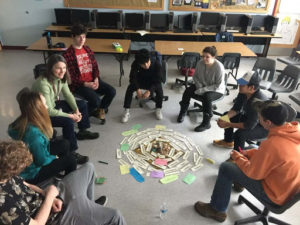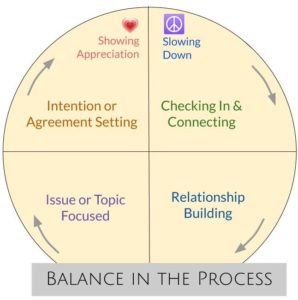Holistic Restorative Education Certificate Program
Teaching has become more challenging due to a significant uptick in mental health challenges for youth, increased pressure to focus on academic outcomes, more challenging student behaviors, and the impact of inequitable systems. Through an intensive exploration of trauma-sensitive practices, mindfulness, social-emotional learning, equity and restorative practices, this program will prepare you to better meet the needs of students, staff and learning communities. We hope you will join us to build our efficacy as educators and leaders, increase wellness for all, and become agents for change in education.
Program Overview
Social neuroscientists and educational theorists agree that human beings learn best when they experience safety, connection with teachers and peers, and equity. This year-long, 12-credit graduate program is designed for educators, specialists and leaders who want to build the skills, understanding, awareness, and capacity to support those needs, on a personal and systemic level. The Holistic Restorative Education Certificate Program seeks to be restorative for its participants by shifting how we do education to a more human-centered practice whose success as a whole is dependent on the wellness of all its members.
The Holistic Restorative Education Certificate Program trains educators and leaders in these core practices:
- Mindfulness practices create a strong foundation for the more difficult and nuanced work of transforming how we view student behavior and the factors that influence our every interaction with students and colleagues—positionality, race, trauma, toxic stress, neurodiversity, mental health, and culture.
- Restorative Approaches includes the circle process, restorative communication, restorative conferencing, implementation strategies, and the guiding restorative principles as applied to all aspects of school life—responsive and proactive.
- Healing Centered Engagement addresses the root causes of unexpected and disruptive behaviors by changing the way we experience and understand the impact of trauma, toxic stress, anxiety, other mental health issues, and expanding our skills in teaching social emotional learning (SEL).
- Culturally Responsive Teaching practices are at the heart of our aspiration to meet the needs of ALL learners. Using reflective practices, deep listening, identity exploration, and circle discussions we begin to change implicit bias and unconscious patterns and become more courageous and effective educators and leaders.
Mindfulness and Equity are powerful throughlines in this program. Designed to support educators as they face the challenges present in their school community, this program will offer mindful awareness and mindfulness practices to increase mental and emotional wellbeing, develop bias awareness, prevent or address compassion fatigue and burnout.
Learn more about the program
Program Design and Approach
In our course design and instruction we seek to “practice what we preach.” One way we do this is to follow the restorative “Balance in the Process” in our class routines. This is the process of slowing down and connecting before engaging with the content. Another way we do this is to develop collaborative class ethos, equitable and differentiated structures for contributing, and frequent opportunities to provide feedback.
This program is nearly 100% online with synchronous and asynchronous elements. One week of in-person engagement is required for the summer portion. Studying what works in online learning, we work hard to create online learning communities that are surprisingly close, supportive, and engaging. And, in so doing this program aspires to connect a diverse mix of educators from all over the country and world
Our instructors and guest instructors are experts in their fields with practical, real-life experiences to share. They also come to this work with humility, the desire to learn more, and to be challenged. Therefore, course structure is highly interactive and reflective, designed to bring out the knowledge and gifts of everyone in the room, whether that “room” is online or in person.
Each course uses a small cohort model for participants to dive deep, practice deep listening and restorative communication with the goals of learning and transformation. In addition, action research projects using the ‘plan, do, study, act’ allow participants to witness their learning in action. Instructors provide individualized feedback and are available by phone, email or text for additional support and learning.
Finally, our program is aspirational. We believe that these core practices, learned together as interdependent pieces of a whole approach, will empower participants to create significant positive change in their own lives and the lives of their students and school community members.
Program Details:
- 12 graduate credits
- Year-long program started in Spring or Summer of the academic year
- Online program with 1-week on-campus in the summer (typically in early August)
- One course (3-credits) per term
- Courses are designed as a four-part sequence of learning:
- GED 501: Transforming Teaching and Learning Through Mindfulness and Restorative Practices (spring semester)
- GED 502: Creating Equity-Focused, Healing Centered Classroom and Schools (summer)
- GED 503: Restorative Responses to Harm – in Schools and in Society (fall semester)
- GED 504: Practicum (spring semester)
Application Process
The next cohort will begin their learning journey in Spring 2025. The application deadline is November 1, 2024.
Educators who have already completed GED 501 Transforming Teaching and Learning through Mindfulness and Restorative Practices and/or GED 502 Creating Equity-Focused, Healing Centered Classroom and Schools and are interested in completing the program need to apply for the 2025 cohort.
Please email graduate@smcvt.edu or call 802.654.3000 for more information and how to apply.

